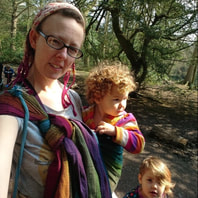Parenting with your partner is hard. When it’s your ex-partner you’re working with to raise your children things get far more complicated. I have a whole set of ex-partners that I’m co-parenting with, well 3 to be precise. I’ll be the first to admit I don’t get it right every time, far from it in fact.

There are reasons these people are my ex-partners, but that’s not what’s important here. I have children that I’m parenting with these people. So my focus on how I feel about them as ex partners, as people, has to be shifted so that the emphasis is on how to work with them as parents. It’s far from easy and there are always big emotions involved on both sides. But I have found way to make things easier, here are my top tips for calm co-parenting.
This isn’t about you
Break ups are very often complicated and messy. There’s always a ton of emotional stuff to work through and practical things that have to be done. Being married or having a mortgage together means the legal side of things can drag on and get expensive. Aside from that, there are small humans who are getting used to this shift and you are both going to need to be there to guide them through it. Whether you’re the parent that they live with or the one they visit or if you manage to work it 50/50 this is a massive change for all of you.
It’s really easy to get caught up in playing the blame game and throw accusations around. But what are you achieving here? Really? Depending on how old your little people are, you could be doing this for the next 10, 15 years or more. So, like it or not you’re going to need to get used to this and find a way to make it work.
Recognising that this isn’t about you or your ex and that this is about how you work together to put your children’s needs first is a really important step. Vent your frustrations at a friend or relative, in a facebook group, write it down in a diary. Basically do whatever it is you need to do to get it all out so it isn’t directed at your ex will really help to keep things calmer. Keep your own feelings separate when you can. It’s not easy to hold your tongue, but it does make a difference to co-parenting when you manage it.
Set clear boundaries
Yes, this works for ex-partners as well as small folk! Ok, joking aside, what I’m really talking about here is having a plan. Knowing what you’re going to expect from each other. Knowing who’s going to do what and when and what parenting practices you really can’t get on board with early on makes a big difference.
You could be doing a 50/50 split time wise. One of you may be having the children most of the time and the other is having contact. Whatever this looks likes,make a plan and be as clear as you can. Sticking to set days and times each week will make things more predictable for all of you. If times or days need to change, how are you going to manage that? If you do shift work or changeable hours it can be help to work a month in advance so there’s not last minute confusion. What happens in the school holidays? What about if your little one is off poorly? Thrashing this out early on will help everyone to adapt to the new way things work.
Parenting choices can be really tricky. Especially if you’ve already found you don’t see eye to eye on certain things. Identifying your hard limits can be really useful. For example, there’s bound to be some things like not using a naughty step or not allowing certain programs to be watched on the TV that one of you feels really strongly about. If you can agree to work together on the really fundamental things then that’s a great foundation for co-parenting. Equally, if you can, try letting some of the smaller things go so you don’t end up in constant battles. Children will get used to the ‘rules’ and boundaries being different at one parents house to the others.
Make time to talk
This doesn’t have to be a big thing. Keeping each other up to speed with what’s going on is really important. Particularly if you are the parent who just has a day a week or every other weekend, you’re going to miss a lot of the day to day stuff. Keeping each other updated on what’s been happening will help your co-parenting relationship. How you do this is up to you. It could be that you take a few minutes at each handover to do a quick update. This child has a reading book from school they need to read tonight. That child has a bit of a cold so isn’t sleeping great. This child fell out with their friend and is feeling a little sad at the moment or whatever.
If that’s not practical, then quick call once a month to pass on important stuff or more ad-hoc when significant things happen are also good options. Whatever you choose when co-parenting, it means this information doesn’t come as a surprise. The child can also see their parents communicating and putting their needs and emotions first.
Write it down
When communication is really strained between you, it can help to keep verbal communication to a minimum. Although it’s really helpful for your little ones to be able to witness the communication, if that’s likely to lead to arguments or tension then communication in whatever way it happens is good enough. It may be that you choose to email or text rather than phone when you need to pass on information to your ex or arrange contact etc
A contact book can also be a useful co-parenting tool if you are struggling to talk to each other. This is just a note book that you write down things that you have done with your child while they’ve been with you. Then add any things that need to be done by the other other parent; homework or if they have a club or activity to go to; if the child has any worries or concerns at the moment, if they’ve been poorly, that kind of thing.
Then pass it to the other parent when the children go to them. And, it’s not just for really strained relationships either. It can be useful for parents who struggle to remember things on the spot and for very young children who can’t tell you what they’ve been up to. It can be nice to see a little narrative on the time they’ve been away.
Listen to your small folks
So, fast forward a few months. Your child will start to get used to the idea that their parents are living separately. You will have had those conversations that explain the new co-parenting arrangement. It’s likely that your child will still have lots of questions and worries. Expect their behaviour to show lots of big emotions for a while until things settle. This may well take longer than you think. Lots of reassurance and frank and open conversation will be needed to guide your little one through this. Being honest about what’s happening, using age appropriate language and asking lots of questions will all help to open up conversations.
Advocacy and Respect
Your children can have very strong opinions on what happens. This may not be convenient or easy for either parent, respecting their views is really important. Sometimes your little one won’t want to go to the other parents house or may have concerns about the time they spend with them. It can be so difficult to manage, but it’s really common. Particularly when going to the parent who has moved out of the family home or the one they don’t see as much of.
Talk to them about their concerns and try to identify what is worrying them. It may be an easy fix, like they don’t like the colour of their bedroom or where they sit for tea. Advocate for them and discuss with your ex how they can make this better for them. This is another great opportunity for them to see you working together as parents. If it’s not so simple, maybe they could not go this week? Or maybe for a shorter visit? Respecting their choices when you can will help them to feel more confident next time.
As your children get older they may want to change things, to spend more or less time with one parent. They may even want change the parent they live with most of the time. As they move into their teenage years, this is common, chances are they want to have some control over their choices. They may want to test out what happens if they choose to live with the other parent. If you have had them at home for a number of years, this can feel really awful. You don’t have to say yes. Simply letting them know that you respect their views and being prepared to talk things through with them is important.
You’ve got this!
All of this stuff is really hard. As a grown up and as a parent, I find it hard not to let how I feel about the other parents get in the way. It’s not always calm co-parenting. We have cross words from time to time, they really piss me off at times and I’m sure that they feel the same about me. We’re all human, we all get it wrong and we both have our own emotions to deal with. But, mostly when it comes to parenting together we manage pretty well. Like a lot of things, the key really is communication. In whatever way you can, keep talking, you’ve got this!
Jeni Atkinson- CalmFamily Derby and Nottingham

Jeni is a wonderful, compassionate and inspiring woman: “Just because our parenting is gentle doesn’t mean it doesn’t make a difference, the way we raise our children will impact how they feel about themselves & the choices they make as they grow up. I want to see things change in their lifetime, I want to fight back against the childist views of our patriarchal society, I want to see a world where children are allowed their own autonomy, that lets them learn for themselves, make their own mistakes. A society where diversity in all its forms is celebrated, where neurodiversity, mental health, sex & sexuality, gender, politics & all these subjects that are shied away from are talked about openly. A society where parents are inspired & supported to make the choices that work from them & their families. Oh & save the planet at the same time!”
Recommend0 recommendationsPublished in Being a parent, Calmer relationships, Coparenting, Parents & families, Single parents


Responses